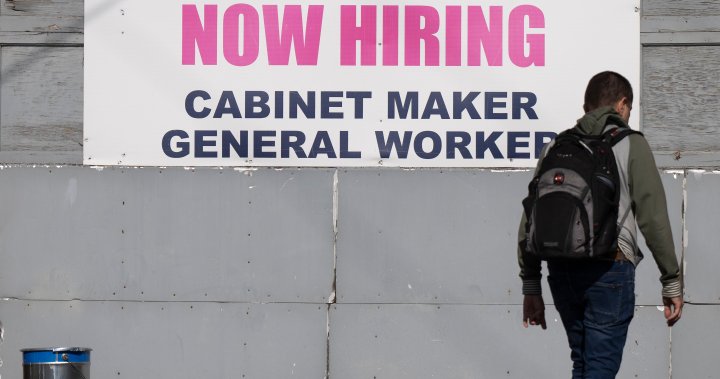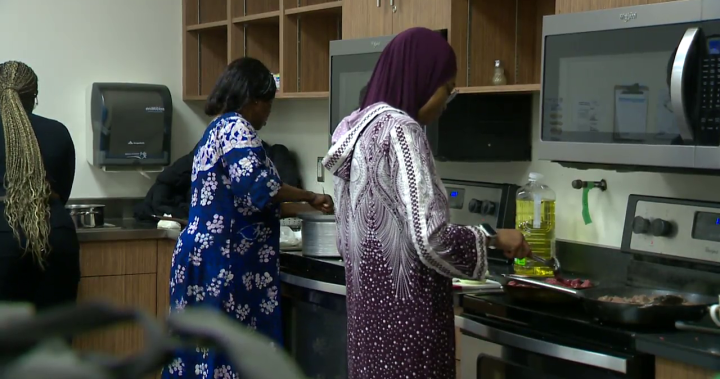Rama Krishnan remembers being dressed in a blue Best Buy employee T-shirt, working alongside people half his age, and asking himself, “Did I make a mistake by moving to Canada?”
Krishnan said he had already been a high-level sales executive in Bangalore, India, for over 20 years when he moved to Canada in 2007. Wherever Krishnan applied for a job, he was asked the same question: Do you have any “Canadian experience”?
“When you are rejected from job after job, simply because you don’t have Canadian experience, one starts to lose faith in the system. And one starts to lose confidence,” he told Global News.
The requirement for Canadian experience refers to the preference that some employers have for candidates who have worked for a Canadian employer before.
There is growing concern, especially as Canadian governments boost efforts to target immigration levels to meet needs for key work sectors like health care and housing, that this puts newcomers at a disadvantage: they can’t get hired for a role unless they have Canadian experience, and they can’t get Canadian experience on their resume unless they get hired.
To overcome this hurdle, many end up working minimum-wage jobs despite having higher qualifications and work experience from their home country. Krishnan, for example, spent seven years moving between a job at Best Buy and consulting for businesses based in India.
“It was a surreal feeling. I was simultaneously selling cellphones and consulting with CEOs. It sounds like a scene out of a Bollywood movie,” he said.
Canada’s most populous province, which is also home to the highest volume of new immigrants, is planning to tackle the matter in the coming months.
On Nov. 4, the government of Ontario introduced Bill 149, the Working for Workers Four Act, 2023 — legislation that would make it illegal for businesses to list “Canadian experience” as a requirement in job listings. The province says this is to remove barriers to entry in the Canadian job market for newcomers.
“For far too long, too many people arriving in Canada have been funnelled toward dead-end jobs they’re overqualified for. We need to ensure these people can land well-paying and rewarding careers that help tackle the labour shortage,” said David Piccini, Ontario’s minister of labour, immigration, training and skills development.
“When newcomers to Ontario get a meaningful chance to contribute, everyone wins.”
This follows a change Ontario brought in 2021, which removed Canadian experience as a requirement for professional registration and licensing in 30 regulated professions. The 2021 changes applied to non-health regulated professions and compulsory trades such as professional engineers, architects, plumbers, electricians, accountants, hairstylists, teachers and early childhood educators.
Bill 149, if passed, would extend to all provincially regulated businesses – which is most businesses in Ontario. The new provisions would be focused on the application stage, to ensure that immigrants with foreign credentials and work experience are not screened out before the interview stage.
A provincial spokesperson told Global News the law would be enforced by employment standards officers (ESOs), who will have the power to issue a compliance order if they notice a reference to “Canadian experience” in a job listing.
Additionally, applicants will be able to make a complaint with the Ministry of Labour, Immigration, Training and Skills Development if they notice a violation.
The bill also requires businesses to disclose if they are using artificial intelligence (AI) software tools for recruitment. The law is expected to go into effect sometime in the first half of 2024.
The move is intended to help immigrants get a foot in the door.
According to the province, only one-quarter of internationally trained immigrants in Ontario were employed in the regulated professions for which they trained or studied.
But it also aims to address Ontario’s labour shortage.
According to a BuildForce Canada report, Ontario is expected to see 82,600 workers retire in the construction sector. While the province is expected to add 88,400 construction workers, it will actually need 118,900 workers to meet its labour needs.
Claire Fan, an economist at the Royal Bank of Canada, said Canada is massively underutilizing its current immigrant workforce.
An RBC report released in September, which Fan authored, said 30 per cent of immigrants to Canada with a degree in medicine, dentistry, veterinary medicine or optometry worked in unrelated fields, compared with just 4.5 per cent of non-immigrants also educated in these fields.
For immigrants with foreign credentials and degrees, the barriers to entry are high, including for those who have trained in specialties like medicine abroad.
“The current process to get them certified here, to be able to practise in Canada, is extremely difficult,” Fan said.
“If you’re an immigrant who studied outside of Canada, there’s a 50 per cent chance that you work in a job that’s below what you actually train for.”
Arpit Modi, who runs a career bridging course for newcomers, welcomed Ontario’s new proposed legislation. He said he often hears concerns that the “Canadian experience” requirement is used to discriminate against immigrants.
“What is sufficient Canadian experience? The thing is, nobody can really define it. Whenever one of my students is told they don’t have enough Canadian experience, I tell them to ask what that means,” he said. “It is a way to discriminate against newcomers. I’m glad Ontario is banning it.”
Sweta Regmi, a career counsellor, said while the law was necessary, it needs to be followed by a mindset change among recruiters.
“I still believe that it’s a mindset issue. Government can ban whatever they want to, but hiring teams would have biases internally, deeply rooted in the system,” she said.
Regmi moved to Canada in 2001 and her husband, an IT professional with years of experience in the United States, struggled to find a job. They both worked in a glassmaking factory to gain Canadian experience. She said it was unfortunate that the conversation had not moved much.
“There is no matrix for what’s ‘not a fit,’” she said. “Do you know how many new immigrants come to me and ask me, ‘Is it my name? Can I change it? Can I “whiten” my resume?’”
She added that in the future, new laws will need to take into account how recruiting software – particularly when powered by artificial intelligence – feeds into recruitment biases. She said recruiters should be careful that AI tools aren’t weeding out resumes with no Canadian experience before they are seen by human eyes.
Modi said other provinces should follow Ontario’s example.
“Ontario has the highest number of new immigrants, but Alberta and British Columbia will also face this problem. What happens in Ontario happens elsewhere a year later,” he said. “Other provinces should follow this example.”
After spending over 15 years in Canada, Krishnan has finally found his feet teaching supply chain management and project management at a Toronto career college.
“I hope organizations follow this new law in spirit,” he said. “What happened to me should not happen to future generations of immigrants.”




